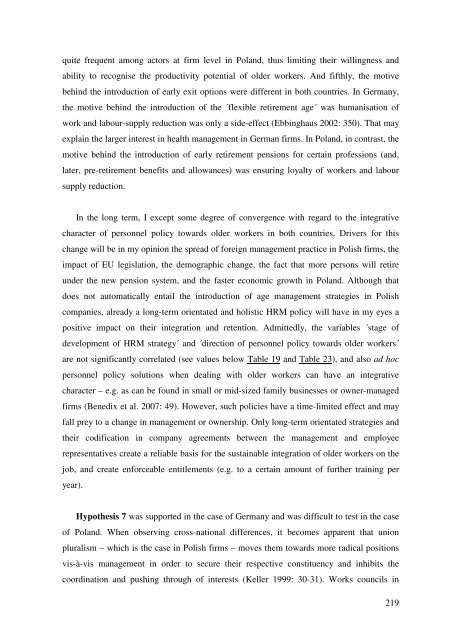Dissertation_Paula Aleksandrowicz_12 ... - Jacobs University
Dissertation_Paula Aleksandrowicz_12 ... - Jacobs University
Dissertation_Paula Aleksandrowicz_12 ... - Jacobs University
Create successful ePaper yourself
Turn your PDF publications into a flip-book with our unique Google optimized e-Paper software.
quite frequent among actors at firm level in Poland, thus limiting their willingness and<br />
ability to recognise the productivity potential of older workers. And fifthly, the motive<br />
behind the introduction of early exit options were different in both countries. In Germany,<br />
the motive behind the introduction of the ´flexible retirement age´ was humanisation of<br />
work and labour-supply reduction was only a side-effect (Ebbinghaus 2002: 350). That may<br />
explain the larger interest in health management in German firms. In Poland, in contrast, the<br />
motive behind the introduction of early retirement pensions for certain professions (and,<br />
later, pre-retirement benefits and allowances) was ensuring loyalty of workers and labour<br />
supply reduction.<br />
In the long term, I except some degree of convergence with regard to the integrative<br />
character of personnel policy towards older workers in both countries. Drivers for this<br />
change will be in my opinion the spread of foreign management practice in Polish firms, the<br />
impact of EU legislation, the demographic change, the fact that more persons will retire<br />
under the new pension system, and the faster economic growth in Poland. Although that<br />
does not automatically entail the introduction of age management strategies in Polish<br />
companies, already a long-term orientated and holistic HRM policy will have in my eyes a<br />
positive impact on their integration and retention. Admittedly, the variables ´stage of<br />
development of HRM strategy´ and ´direction of personnel policy towards older workers´<br />
are not significantly correlated (see values below Table 19 and Table 23), and also ad hoc<br />
personnel policy solutions when dealing with older workers can have an integrative<br />
character – e.g. as can be found in small or mid-sized family businesses or owner-managed<br />
firms (Benedix et al. 2007: 49). However, such policies have a time-limited effect and may<br />
fall prey to a change in management or ownership. Only long-term orientated strategies and<br />
their codification in company agreements between the management and employee<br />
representatives create a reliable basis for the sustainable integration of older workers on the<br />
job, and create enforceable entitlements (e.g. to a certain amount of further training per<br />
year).<br />
Hypothesis 7 was supported in the case of Germany and was difficult to test in the case<br />
of Poland. When observing cross-national differences, it becomes apparent that union<br />
pluralism – which is the case in Polish firms – moves them towards more radical positions<br />
vis-à-vis management in order to secure their respective constituency and inhibits the<br />
coordination and pushing through of interests (Keller 1999: 30-31). Works councils in<br />
219
















